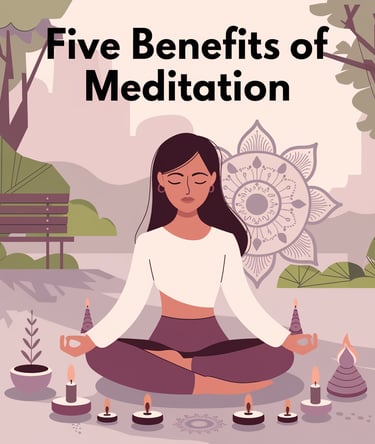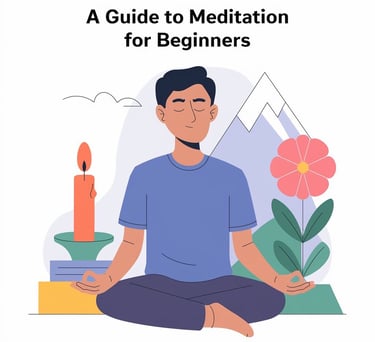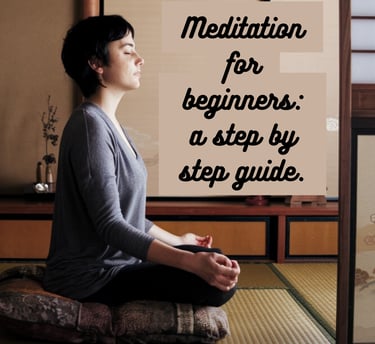
Meditation

Five Minute Meditation for Health and Wellness
5 Life-Changing Benefits of
Meditation You Need to Know
In today's fast-paced world, it's easy to feel overwhelmed, stressed, and disconnected from ourselves. But what if there was a simple practice that could transform your life in profound ways? Enter meditation - the ancient art of training the mind to find inner peace, clarity, and well-being.
While meditation may seem like a buzzword these days, the benefits it offers are anything but superficial. From reducing stress to enhancing creativity, the power of this practice is well-documented. In this blog post, we'll explore the top 5 life-changing benefits of meditation that you simply can't afford to ignore.
1. Stress and Anxiety Relief
One of the most well-known benefits of meditation is its ability to alleviate stress and anxiety. By teaching you to focus your attention and become more present, meditation helps quiet the endless chatter of the mind. This, in turn, can lower cortisol levels, the primary stress hormone, and promote a sense of calm and relaxation
2. Improved Focus and Concentration
In our distraction-filled world, staying focused can be a real challenge. Meditation, however, can help train your mind to be more attentive and focused. By repeatedly bringing your attention back to your breath or a specific object, you're strengthening your "mental muscle" and enhancing your ability to concentrate.
3. Enhanced Emotional Regulation
Meditation has been shown to improve emotional intelligence and self-awareness. By becoming more attuned to your inner thoughts and feelings, you can learn to respond to difficult emotions with more clarity and compassion, rather than being swept away by them.
4. Boosted Creativity and Intuition
Contrary to popular belief, meditation isn't just about quieting the mind - it can also spark your creative potential. By allowing your mind to rest and explore new perspectives, meditation can open the door to innovative ideas, fresh insights, and a heightened sense of intuition.
5. Improved Physical Health
The benefits of meditation extend beyond the mind - they can also positively impact your physical health. Regular meditation has been linked to lower blood pressure, improved immune function, and even better sleep quality. By reducing stress and promoting relaxation, meditation can be a powerful tool for overall well-being.
Unlock Your Full Potential with Meditation
Regardless of your age, background, or current state of mind, the transformative power of meditation is accessible to everyone. Whether you're looking to reduce stress, enhance your focus, or simply find more peace and joy in your daily life, this ancient practice can be a game-changer.
So why not give it a try? Start small, be patient with yourself, and allow the magic of meditation to unfold. Your mind, body, and soul will thank you.








How to Meditate: A Beginner’s Guide to Finding Calm
Meditation is a powerful tool for reducing stress, enhancing focus, and promoting overall well-being. If you’re new to meditation, it can seem daunting, but it doesn’t have to be! This guide will walk you through the basics of meditation, providing simple instructions to help you get started on your journey to inner peace.
What is Meditation?
Meditation is a practice that involves focusing your mind and eliminating distractions to achieve a mentally clear and emotionally calm state. It can take many forms, but the core principle is to cultivate awareness and mindfulness.
Benefits of Meditation
- Reduces stress and anxiety
- Improves concentration and focus
- Promotes emotional health and well-being
- Enhances self-awareness
- Improves sleep quality
Getting Started: Step-by-Step Instructions
1. Find a Quiet Space
Choose a quiet, comfortable location where you won’t be disturbed. It could be a corner of your room, a peaceful outdoor space, or anywhere you feel relaxed. Make sure the area is free from distractions.
2. Get Comfortable
Sit or lie down in a comfortable position. You can sit cross-legged on the floor, in a chair with your feet flat on the ground, or even lie down if that feels better for you. Keep your back straight but relaxed, and place your hands on your knees or in your lap.
3. Set a Timer
If you’re just starting out, aim for a short session of about 5 to 10 minutes. As you become more comfortable with meditation, you can gradually increase the duration. Set a timer on your phone or use a meditation app to help you keep track of time.
4. Close Your Eyes
Gently close your eyes to minimize distractions and help you focus inward. If you’re uncomfortable closing your eyes, you can also lower your gaze and focus on a spot in front of you.
5. Focus on Your Breath
Take a deep breath in through your nose, allowing your lungs to fill with air. Hold it for a moment, then exhale slowly through your mouth. Continue to breathe deeply and naturally. Focus your attention on your breath—the sensation of air entering and leaving your body.
6. Acknowledge Your Thoughts
As you meditate, thoughts will inevitably arise. You might find yourself thinking about your to-do list or an upcoming event. This is completely normal! Instead of trying to suppress these thoughts, acknowledge them and gently guide your focus back to your breath. Avoid judging yourself; meditation is a practice, and it takes time to develop concentration.
7. Return to Your Breath
Whenever you notice your mind wandering, simply return your focus to your breath. You can also count your breaths if that helps—inhale (1), exhale (2), and so on, up to 10. Then start over. This technique can help anchor your mind.
8. Gradually End Your Session
When your timer goes off, take a moment to notice how you feel. Slowly bring your awareness back to your surroundings. Wiggle your fingers and toes, stretch a little if you like, and when you’re ready, open your eyes.
9. Reflect on Your Experience
After your meditation, take a moment to reflect on how you feel. Notice any changes in your mindset or emotional state. You might want to keep a journal to track your progress and thoughts over time.
#### Tips for Successful Meditation
- Be Consistent: Try to meditate at the same time every day to establish a routine, whether it’s in the morning, during lunch, or before bed.
- Be Patient: Don’t expect immediate results. Meditation is a skill that takes time to develop.
- Experiment with Different Techniques: There are various forms of meditation, such as guided meditation, mindfulness meditation, and loving-kindness meditation. Explore different styles to find what resonates with you.
- Use Apps or Videos: Consider using meditation apps or online videos for guided sessions, which can be especially helpful for beginners.
Conclusion
Meditation is a practice that can lead to profound changes in your life. By setting aside just a few minutes each day to meditate, you can cultivate a sense of calm and clarity that enhances your overall well-being. Remember, there is no right or wrong way to meditate—just find what works best for you and enjoy the journey! Happy meditating!




Exploring Different Meditation Techniques: Find Your Perfect Practice
Meditation is a powerful practice that can enhance your mental clarity, reduce stress, and promote overall well-being. With various techniques available, it’s essential to explore different styles to find the one that resonates with you. This blog post will introduce several popular meditation techniques, providing insight into their unique benefits and how to practice them.
1. Mindfulness Meditation
Overview: Mindfulness meditation focuses on being present in the moment, observing thoughts and sensations without judgment. It encourages awareness of your surroundings, thoughts, and feelings as they arise.
How to Practice:
- Find a quiet space and sit comfortably.
- Close your eyes and take a few deep breaths.
- Bring your attention to your breath, feeling the rise and fall of your chest.
- When thoughts arise, acknowledge them without judgment and gently return your focus to your breath.
Benefits: This technique helps improve focus, reduces stress, and enhances emotional regulation.
2. Guided Meditation
Overview: Guided meditation involves listening to a facilitator or recording that leads you through a meditation session. This technique is particularly beneficial for beginners who may find it challenging to meditate alone.
How to Practice:
- Choose a guided meditation session that appeals to you (many apps and websites offer free options).
- Find a comfortable position and close your eyes.
- Follow the instructions of the guide, allowing their voice to lead you through visualization or relaxation techniques.
Benefits: Guided meditation can help alleviate anxiety, improve relaxation, and provide a structured approach to meditative practice.
3. Loving-Kindness Meditation (Metta)
Overview: Loving-kindness meditation focuses on cultivating feelings of compassion and love towards yourself and others. It encourages positive emotions and helps foster empathy and connection.
How to Practice:
- Sit comfortably and close your eyes.
- Begin by focusing on yourself, silently repeating phrases like “May I be happy, may I be healthy, may I be safe, may I live with ease.”
- Gradually extend these wishes to loved ones, acquaintances, and even those you may have conflicts with, repeating the phrases for each group.
Benefits: This technique enhances emotional well-being, reduces negative emotions, and promotes a sense of connection with others.
4. Transcendental Meditation
Overview: Transcendental Meditation (TM) involves silently repeating a specific mantra for 20 minutes, twice a day. This technique is designed to settle the body into a state of profound rest and relaxation.
How to Practice:
- Find a quiet space and sit comfortably with your eyes closed.
- Silently repeat your chosen mantra (a word or phrase) in your mind.
- If thoughts arise, gently return to the mantra without judgment.
Benefits: TM has been shown to reduce stress, improve focus, and enhance overall well-being.
#### 5. Body Scan Meditation
Overview: Body scan meditation involves focusing on different parts of your body, promoting relaxation and awareness of physical sensations. This technique can help release tension and improve body awareness.
How to Practice:
- Lie down comfortably and close your eyes.
- Take a few deep breaths, grounding yourself in the present moment.
- Start at your toes and gradually move your attention up through your body, noticing any sensations, tension, or areas of relaxation.
- Spend a few moments on each body part before moving to the next.
Benefits: This technique promotes relaxation, reduces physical tension, and enhances body awareness.
6. Zen Meditation (Zazen)
Overview: Zen meditation, or Zazen, is a traditional practice that involves sitting in a specific posture and focusing on the breath. It emphasizes stillness and observation.
How to Practice:
- Sit on a cushion or chair with your back straight and hands resting on your thighs or in your lap.
- Close your eyes or keep them slightly open, focusing on a point in front of you.
- Breathe naturally and bring your attention to the sensations of your breath.
- If your mind wanders, gently bring your focus back to your breath.
Benefits: Zen meditation enhances concentration, promotes inner peace, and cultivates mindfulness.
Conclusion
Meditation is a versatile practice with a variety of techniques to suit different preferences and needs. Whether you’re drawn to mindfulness, guided sessions, or loving-kindness meditation, each technique offers unique benefits that can enhance your mental and emotional well-being. Take the time to explore these different styles, and find the meditation technique that resonates with you. With regular practice, you’ll discover the profound impact meditation can have on your life. Happy meditating!
